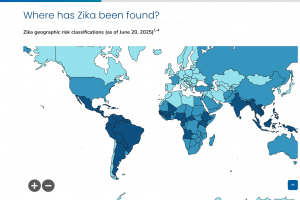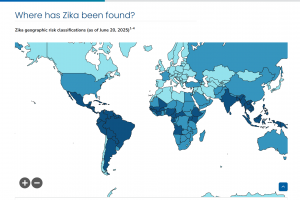Zika Outbreaks
Zika Outbreaks January 2026
Zika virus disease (ZIKV) was first recognized in Uganda in 1947, with the initial human infection confirmed in 1952. As of January 11, 2026, 92 countries and territories have reported evidence of mosquito-transmitted Zika virus infection. Zika outbreaks have been reported in tropical Africa, Southeast Asia, the Pacific Islands, and the Americas. In 2016, the World Health Organization (WHO) declared the Zika virus epidemic a public health emergency of international concern (PHEIC), which ended in November 2016. As of 2026, no PHEIC is active. The WHO published a Global Strategic Preparedness, Readiness, and Response Plan for Aedes-borne arboviruses on January 20, 2025. Studies predict that because of virus-carrying mosquitoes expanding into new geographic areas, about 1.3 billion people could be impacted by Zika by 2050.
Zika in the United States
As of January 2026, the U.S. Centers for Disease Control and Prevention (CDC) Yellow Book states that international travelers with suspected Zika infection should be tested with real-time polymerase chain reaction or an NS1 antigen test. In 2026, public health and commercial lab testing services can detect Zika infections in people. In 2025, the Pan American Health Organization (PAHO) reported travel-related Zika cases in the United States, as Puerto Rico has been categorized as having a risk of Zika transmission for several years. The Hawaiʻi Department of Health announced on May 27, 2025, that it is investigating two travel-related Zika cases. As of December 31, 2024, the U.S. CDC reported 19 non-congenital Zika cases among U.S. residents (1 imported case in Texas). In 2023, the CDC reported five non-congenital cases among U.S. residents and 27 in U.S. territories. The CDC says Zika-spreading mosquitoes are found throughout Puerto Rico, where the Department of Health reports 16 cases in 2024, down from 43 in 2023.
Zika Outbreaks in The Americas
The PAHO has confirmed local transmission of the Zika virus in 52 countries and territories in the Americas since 2015. The PAHO/WHO reports that Zika virus lineages, the African lineage and the Asian lineage, have spread in the Americas. As of December 2025, over 25,800 suspected Zika cases, 1,808 confirmed, and one related fatality were reported in the Americas this year; most confirmed cases are in Brazil. Brazil led the Americas with around 1,801 confirmed cases, lower than 2,067 in 2024 and 3,997 in 2023.
In Mexico, ZIKV was introduced at the end of 2015. There were 4 Zika cases reported by the PAHO in 2025 and 30 cases in 2024. A study in October 2025 included 13,259 suspected ZIKV cases with RT-qPCR results reported from August 2016 to January 2018, of which 10.7% (n = 1,419) were positive for ZVD. The study observed 25% (n = 3,313) ZIKV-positive cases in Mexican pregnant women. The three Mexican states with the highest number of ZIKV-positive cases were Veracruz, Nuevo León, and Yucatán.
The PAHO reported 42,127 suspected ZIka cases and two associated fatalities in the Americas in 2024, with the highest proportion of reported cases in Brazil. The PAHO reported over 37,65allegedspected cases in the Americas in 2023. In 2021, the U.S. CDC removed its Level 2—Practice Enhanced Precautions notice regarding Argentina's Zika outbreak. Although the Zika outbreak in southern Brazil has slowed in recent years, live births with microcephaly continue to be reported.
Zika in Europe
The European Centre for Disease Prevention and Control (ECDC) says the Zika virus is not endemic in mainland Europe. In August 2025, France reported four travel-related Zika cases. In November 2024, Italy reported 7 imported Zika cases this year. On September 11, 2024, France reported five imported cases of Zika in 3 departments colonized by Aedes albopictus. In 2022, the European CDC reported that 31,453 Zika patients were confirmed in 13 of 52 countries and territories. In addition, the WHO reported in 2019 that French authorities confirmed an autochthonous Zika virus case in Hyeres, Var department.
Zika United Kingdom
Zika virus disease cases also decreased to 4 cases in the first half of 2025. Zika cases increased to 16 in England, Wales, and Northern Ireland in 2024, up from 8 in 2023. Thailand (5 cases) and Singapore (2) were the most frequently reported travel countries. The UK Health Security Agency (UKHSA) issued a warning on March 21, 2024, concerning Zika outbreaks. Travel-related Zika cases in the UK peaked in 2016 with 725 cases.
Zika Asia
In Bangladesh, the Zika virus was first detected in 2014; subsequently, five cases of Zika were identified in 2023. A cluster of 10 locally acquired Zika cases was confirmed near Dhaka, Bangladesh, between September and December 2024.
Zika Virus Infection Impact
According to the WHO, there is scientific consensus that the Zika virus is transmitted to people by mosquitoes of the genus Aedes. Since 2013, countries and territories have reported cases of congenital microcephaly and other central nervous system malformations associated with Zika virus infection. The 2015–2016 ZIKV outbreak in the Region of the Americas revealed the ability of ZIKV from the Asian lineage to cause congenital disabilities, which caused severe congenital disabilities of the brain and eyes, including severe microcephaly. Zika infections can cause microcephaly, Guillain-Barré syndrome (GBS), and other central nervous system malformations. In February 2016, the WHO declared Zika-related microcephaly a Public Health Emergency of International Concern (PHEIC). The causal link between the Zika virus and congenital malformations was confirmed, and the PHEIC declaration was lifted in November 2016.
Zika Infection in Infants
On July 3, 2025, The Lancet published: A decade later, what have we learned from the Zika epidemic in children with intrauterine exposure. The Zika virus in pregnancy carries severe teratogenic potential to the fetus, ranging from congenital Zika syndrome to milder neurodevelopmental sequelae. Congenital Zika syndrome is associated with a spectrum of alterations that can affect cognitive, language, and motor development. The first human cases were detected in 1952. The U.S. CDC published Research, Volume 30, Number 2—February 2024: a temporal phylogenetic analysis revealed limited within-host diversity among most ZIKV-persistent-infected associated samples. The researchers detected unusual viral diversity, uncovering the existence of divergent genomes within the same patient. During pregnancy, healthcare providers can monitor the fetus for signs of congenital Zika virus infection.
Congenital Zika Syndrome
An Original Investigation published by JAMA Public Health on January 23, 2025, found that children younger than 5 years born with congenital Zika syndrome (CZS) had a 13.10-fold higher hazard of death compared with those without CZS. The cause-specific mortality hazard ratios were 30.28 for respiratory diseases, 28.26 for infectious and parasitic diseases, and 57.11 for nervous system diseases. Research published in Communications Biology and the Liverpool School of Tropical Medicine on January 20, 2025, reported that the Zika virus hijacks the skin of its human host to send chemical signals that lure more mosquitoes to infect and spread the disease further.
A study published in Pediatrics in January 2025 concluded that children exposed to ZIKV in utero, even without CZS, demonstrate a greater risk for neurodevelopmental delay in early childhood, with the timing of maternal infection being a significant predictive risk factor. The International Journal of Infectious Diseases published a study in 2025 showing that children with CZS are more likely to experience frequent hospitalizations in early childhood. Scientists have reported that ZIKV RNA is detectable in the semen of infected men for months and is found in newborn children.
Zika and Dengue Co-Infections
A significant safety concern for vaccine development against ZIKV is the antibody-dependent enhancement of infection between ZIKV and the Dengue virus. Preexisting immunity to ZIKV has been recognized as a factor that can aggravate subsequent Dengue infection in animal models and humans.





